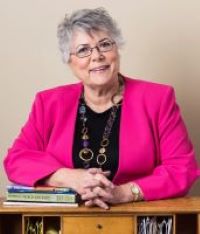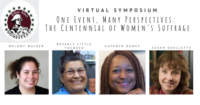Born a slave in New Paltz, New York, Isabella Baumfree walked away from slavery and in her travels evolved into Sojourner Truth: maid, laundress, evangelist, abolitionist, and suffragist. This program, presented by Kathryn Woods, tells Sojourner Truth’s story in her own words, speeches, and songs.
A presentation of the Vermont Humanities Council, organized by American Association of University Women, Bennington Branch.
Dr. Sally Roesch Wagner on the Women’s Suffrage Movement: Virtual Discussions
October 21 – October 23 @ 5:30 PM EDT. Free Online Presentations.
The Women’s International League for Peace and Freedom Burlington Branch hosts virtual presentations by Dr. Sally Roesch Wagner on the women’s suffrage movement. Co-sponsored by VSCA, presentations are open to the public at no cost and will be recorded. Register for these virtual presentations via links below. There will be opportunities for live discussion.
WOMEN VOTED HERE — BEFORE COLUMBUS
Wednesday, October 21
7-9 PM. Zoom presentation sponsored by St. Michael’s College.
Register at: http://bit.ly/before-columbus
While white women were the property of their husbands and considered dead in the law, Haudenosaunee women had more authority and status pre-Columbus than United States women have today.
Women of the Six Nation Iroquois Confederacy (the Haudenosaunee) had the responsibility for putting in place the male leaders. They had control of their own bodies and were economically independent. Rape and wife-beating were rare and dealt with harshly; committing violence against a woman kept a man from becoming Chief in this egalitarian, gender-balanced society.
WOMEN’S SUFFRAGE: THE REST OF THE STORY
Thursday, October 22
2-3:30 PM. Zoom presentation at Community College of Vermont.
Register at: http://bit.ly/rest-of-the-story
I am sick of the song of suffrage, Elizabeth Cady Stanton wrote Matilda Joslyn Gage in the 1880’s. Gage concurred. These two women had begun to think differently than Susan B. Anthony, their co-leader of the National Woman Suffrage Association, who believed the movement should concentrate on getting women the vote. We already have that right, Gage contended.
In a system based on consent of the governed, the government just needs to protect our right to exercise citizenship, not “give” it to us. We need to look at the larger issues.
Stanton and Gage agreed. Those issues were: creating a system of cooperation, not competition; ensuring that every child born was wanted and women were the “absolute sovereigns” of their bodies; rebalancing economic disparity while gaining equal pay for women and demanding a “true” religion, one that fostered freedom and equality for all.
POWER, PRIVILEGE & THE VOTE: FOCUS ON WOMEN, CULTURE AND HERSTORIES OF SUFFRAGE
Thursday, October 22
5-6:30 PM Microsoft Teams. presentation at University of Vermont
Register at: https://bit.ly/35POSiO
This presentation explores important influences in the US Women’s Suffrage movement that are often forgotten but are critical to the concerns of today.
Who were the women presidential candidates in the 1800’s? When in 1884, with the exception of the territories of Wyoming and Utah, it was against the law for women to vote in every state and territory in the union. What were the challenges they faced?
How did the indigenous people (Haudenosaunee women) influence ideas of women’s suffrage and rights?
Who was not included in the US suffrage movement? What were the reasons?
As we approach the 2020 election, how can the herstories of women’s suffrage provide a lens to explore the ongoing creation of democracy in our country.
WOMAN PRESIDENTIAL CANDIDATE – IN 1872 AND 1884
Friday, October 23.
4-5:30 PM. Zoom presentation at Middlebury College Gender and Women Studies
Register at: http://bit.ly/middleburySRW
Victoria Woodhull, the first woman to declare her candidacy for President of the United States, spent election night in jail for exposing two #MeToo-like violations in her newspaper. She was arrested under the Comstock obscenity law in 1872, a law that prohibited the distribution of any information related to contraception or sex.
While Woodhull never carried out a presidential campaign, Belva Lockwood did. Disgruntled feminists formed the Equal Rights Party in 1884 when both the Republicans and Democrats continually ignored women’s concerns. Presidential candidate Belva Lockwood declared that “It is quite time that we had our own party; our own platform, and our own nominees,” even if they couldn’t vote for them. With the exception of the territory of Wyoming, it was against the law for women to vote in every state and territory in the union.
Lockwood never made it to the White House. “Reforms are slow, but they never go backwards,” she reflected. “Their originators may die, but the reform will live to bless millions yet unborn.”
As we approach the 2020 election, Lockwood provides a lens through which to explore the ongoing creation of democracy in our country.
Singer-Historian: Linda Radtke
Linda Radtke will open and close all three programs with music which was essential to the movement. Each state convention of suffragists began and ended with songs. Linda, a Vermont high school teacher for 31 years now produces the VPR Choral Hour on Vermont Public Radio. A classically trained singer, Linda is a member of Vermont’s professional vocal ensemble, Counterpoint, the Oriana Singers, and the Arioso Chamber Ensemble. She also sings with a vocal quartet, Ah!Capella, sponsored by the Vermont Symphony.
Dr. Wagner is a nationally recognized lecturer, author and story-teller of woman’s rights history. One of the first women to receive a doctorate in the United States for work in women’s studies (UC Santa Cruz), and a founder of one of the country’s first college women studies programs, (CSU Sacramento), Dr. Wagner taught women’s history for forty-eight years. She served as historian in PBS’s One Woman, One Vote, and appeared as a “talking head” in Ken Burns’ documentary, Not for Ourselves Alone: The Story of Elizabeth Cady Stanton and Susan B. Anthony, and penned the accompanying faculty guide. Dr. Wagner’s Women’s Suffrage Anthology published by Penguin Classics in 2019, unfolds a new intersectional look at the 19th century woman’s rights movement.
Virtual Symposium—One Event, Many Perspectives: The Centennial of Women’s Suffrage
Now a virtual event debuting on Saturday, May 16th, each speaker’s presentation will be recorded so that people can watch and learn at their leisure at ethanallenhomestead.org/suffragesymposium.
A symposium presented by the Ethan Allen Homestead Museum with support from the League of Women Voters of VT, the VT Commission on Women, and the VT Suffrage Centennial Alliance. Special thanks to Burlington Cars, 802 Cars, One Day In July Financial Advisors, and People’s United Bank for their generous support.
Women’s suffrage was a complicated and far-reaching event. Academics specializing in this topic set the historical context and present the stories of the suffrage movement and its impact for Abenaki Women in Vermont, for Native Americans in Federally Recognized Tribes, for African American women, and in the role of education for women and girls.
Melody Walker presents on “Navigating Freedom in Two Worlds.” Melody is an educator, activist, artist, and citizen of the Elnu Abenaki Band of Ndakinna. She is former chair of the Vermont Commission on Native American Affairs and was vice chair when the Elnu received state recognition. She has a master’s degree in History from the University of Vermont and was recently profiled in UVM’s alumni magazine, Vermont Quarterly, here. Melody’s TEDx talk, “Weaving a Thread Through the Seven Generations,” will give viewers the flavor of her engaging presentation style.
Beverly Little Thunder presents “On the Shoulders of our Ancestors and Mother Earth.” An enrolled member of the Standing Rock Lakota Band from North Dakota, she has been both a Sundancer and Inipi Ceremony Water Pourer for over 40 years. Her permanent home is Kunsi Keya Tamakoce, situated high in the mountains of Vermont and comprising 100+ acres of natural beauty, the site accommodates a program of Lakota ceremonial activities each year. Along with leading activities on the land and providing guidance for individuals and families in life’s transitions, Beverly travels widely to speak and share her traditions and work. She speaks about traditional beliefs and ceremonies, community building and personal empowerment, breaking the cycle of violence against women and children, LGBTQA peoples, undoing racism and other forms of oppression through practicing the values of inclusivity and respect that come from understanding our place in the interconnected web of life. She is a teacher, activist, author, “two spirit” woman, a mother of five, grandmother of many, and community leader and teacher for many more.
Kathryn Dungy presents on “…the courage of their convictions: African American Women in the Fight for Women’s Suffrage.” She’s a professor of the social and cultural history of Latin America and the Caribbean; gender and race identity; the Atlantic World, and Antebellum U.S. at Saint Michael’s College. She frequently incorporates her own research into her teaching. Presently she is working on a manuscript entitled The Conceptualization of Race in Colonial Puerto Rico, 1800-1850 and last year presented at “Slavery in the African World: Interrogating the Past and Confronting the Present,” an international conference.
Susan Ouellette presents on “Emma Willard, Women’s Education, and the Campaign for Women’s Suffrage.” She’s a professor of Early America at Saint Michael’s College. She focuses on the first settlement, up to the American Revolution period; Native Americans; Immigration history, especially the experience of Francophones in the Northeast; Textiles history; Women’s history; and diaries and memoirs. Her research enhances her teaching. Her recently published book, “An Extraordinary Ordinary Woman” features research and analysis of the diary of Phebe Orvis, a 19th Century Bristol resident with ties to Vergennes and Middlebury.


